Sports Analogies Hidden In Classic Movies – Volume 116: “3:10 to Yuma”
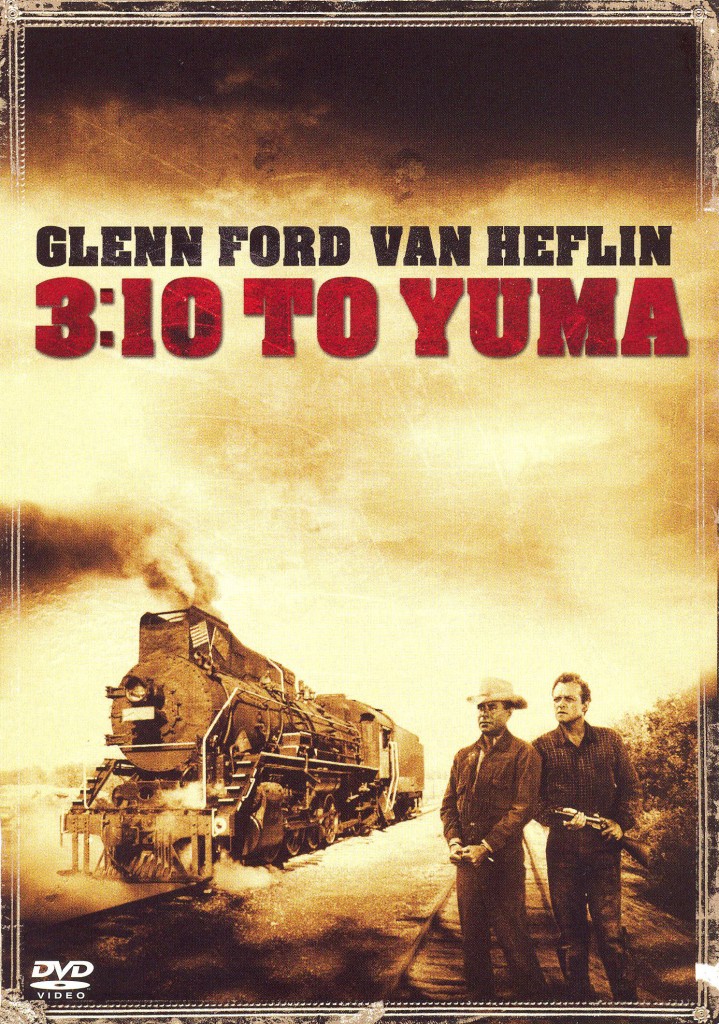
- Today’s Movie: 3:10 To Yuma
- Year of Release: 1957
- Stars: Glenn Ford, Van Heflin, Felicia Farr
- Director: Delmer Daves
This movie is not on my list of essential films.
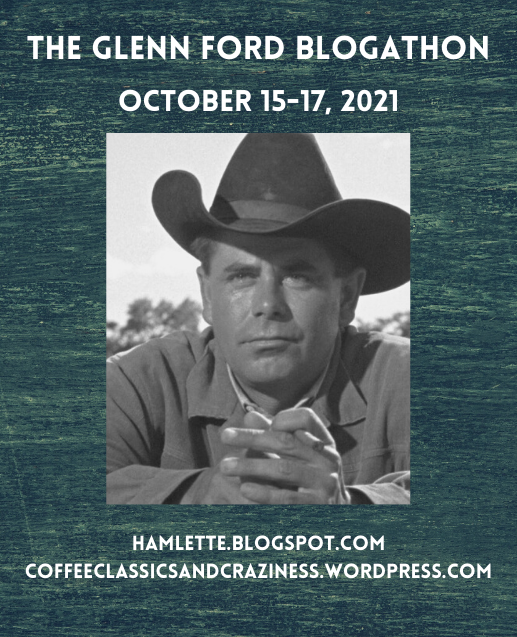
NOTE: This installment of Sports Analogies Hidden In Classic Movies is being done as part of something called the Glenn Ford Blog-A-Thon being hosted by Coffee, Classics, and Craziness and Hamlette’s Soliloquy.
You can see all of the contributions to this blog-a-thon here:
The Story:
While this film is not on my list of essentials, it didn’t miss it by much. 3:10 To Yuma is a classic Western, so much so that it’s use of it’s theme song is parodied in Blazing Saddles. The same guy (Frankie Laine) sings the theme to both, and how the Blazing Saddles theme is used throughout the film inspired by how the theme is used in 3:10 to Yuma. Pay particular attention for the scene in this western where the villain is humming it.
As such, this film opens with a trope-ish stagecoach crossing the desert of the Arizona Territory of the 1880s; it’s accompanied by the aforementioned theme. In no time, a group of riders can be seen herding cattle into the path of the stagecoach. It soon becomes clear this is a robbery; the target being a shipment of gold held on the stage.
The robbery is witnessed by a rancher named Dan Evans (played by Van Heflin) and his sons Mark (played by Jerry Hartleben) and Mathew (played by Barry Curtis). While they are roudnig up their cattle, they stumble upon the stagecoach robbery. Dan comes face to face with the leader of the robbers Ben Wade (played by Glenn Ford), who tells Dan that he can have his cattle once the robbers are done with their deed.

As Wade’s men are off-loading the gold, the stagecoach driver grabs his gun and attempts to stop the robbery; this ends up costing the lives of the driver and another man. Mark wonders why s his father doesn’t intervene, but Dan recognizes Ben Wade and his gang, knows he and his sons are outnumbered, and is fully aware that any attempt to thwart the robbery will result in the deaths of his sons and himself. Once the robbery is completed, Wade take the Evans’ horses and those from the stagcoach so they can’t ride to get the marshal.
Upon returning to his ranch. Dan’s wife Alice (played by Leora Dana) doesn’t understand Dan’s is shocked at her husband’s lack of outrage over the robbery and the loss of his horses. Dan tells here Wade had 11 men with him, and he was powerless to do anything.
“You just seem to expect somethin’ from me that I’m not.”
~ Dan evans
Not to mention, Dan has a bigger problem. Three years of drought has his cattle dying of thirst and he doesn’t have the $200 that a neighboring rancher charges for water rights to a stream on his property. Alice urges Dan to borrow the money; that means a trip to nearby Bisbee.
But Ben Wade and his gang are also in Bisbee. At the local saloon in Bisbee, Wade and his fellow stage robbers are passing themselves off at ordinary ranch hands. They tell Emmy the barmaid (played Felicia Farr), that they just witnessed the stage being robbed and murder of the stagecoach driver.. The marshal (played by Ford Rainey) assembles and deputizes a posse to track down the robbers. As a result, Wade scatters his men in different directions; ultimately to cross in into Mexico and meet in Nogales. Meanwhile, Wade remains in Bisbee as he has eyes for Emmy.
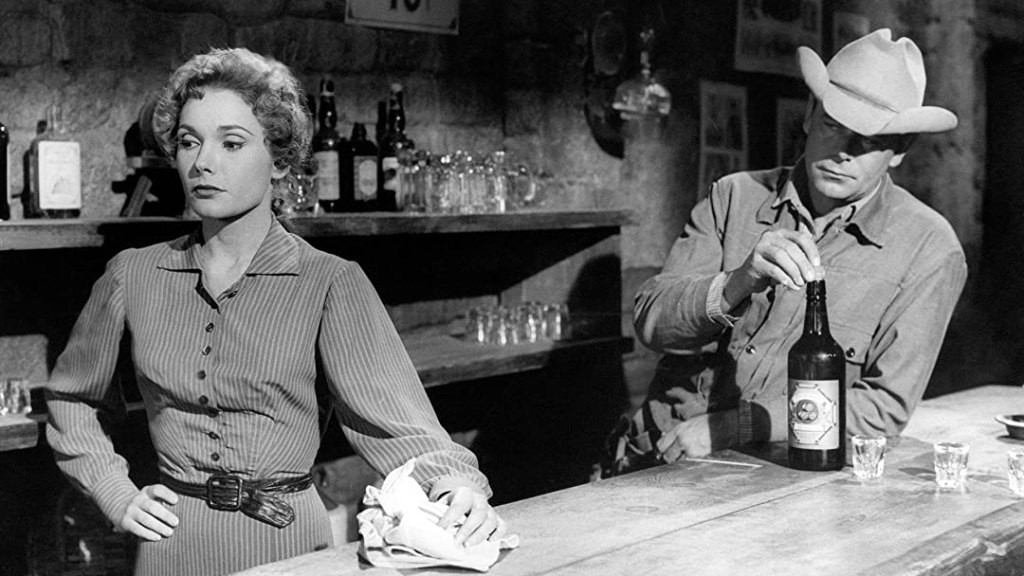
Meanwhile, Dan and the stagecoach owner Mr. Butterfield (played by Robert Emhardt) come upon the spot where Wade’s men buried the two men killed during the robbery. This when when the marshal’s posse arrives to have Butterfield tell them the robbers headed into Bisbee. Once Dan describes Wade and his gang, the marshal realizes he’s been duped. went into Bisbee. Dan describes them and identifies them as Ben Wade and his gang. The marshal realizes he was duped. Right after this, the town drunk Alex Potter (played by Henry Jones), rides onto the scene to reveal that a member of the gang is still in the saloon. Everybody figures out it has to be Wade himself, and the rush is on to get back to Bisbee to arrest him.
Once they get to the saloon, Dan approaches Wade and wants to be paid for half a day he lost rounding up his cattle because of Wade and the robbery. Wade pays the going rate for a full day’s work and well as paying for the time for Dan’s sons, as well as some for “tiring the cattle.” While the money is changing hands, the marshal arrests Wade.
However, the arrest is witnessed by Wade’s right-hand man Charlie Prince (played by Richard Jaeckel). As such, he goes to tell the other members of the gang. Knowing full well Wade’s men will to to break him out of jail, the marshal wants to get Wade out of Bisbee as soon as he can. To aid in keeping Wade in custody and to get him out of town, the marshal wants to deputize Dan. He declines, stating that his priority is to get his cattle access to water.
The marshal then asks for volunteers to ride ahead as scout team, but nobody wants to do it knowing that it could be exceptionally dangerous. Butterfield then ups the ante by offering $200 to any volunteer. This is the exact amount of money Dan needs and he takes the offer. The only other makes to take the money is the drunken Alex Potter.

The plan is for Dan, Alex, and another man who will ultimately be an impostor for Ben Wade to ride to Dan’s ranch. Meanwhile, Wade will be placed in Butterfield’s stagecoach. Knowing Wade’s men will try to rescue him from custody once the coach is out of town, a phony crash of the stagecoach is arranged in full view of Charlie Prince and the rest of Wade’s gang. The marshal makes a show of enlisting help from Dan’s nearby ranch house, and during the confusion, Wade is smuggled out of the stagecoach, hidden at Dan’s ranch house, and replaced on the stagecoach with the impostor. The plan succeeds; Wade’s fall for the ruse.
Now, the plan is while Wade’s men chase down the stagecoach which no longer contains Wade, Dan and Alex will actually be taking him to Contention City and put him on the 3:10 train to Yuma…where the territorial prison is located. The three arrive in Contention City at daybreak, where Butterfield meets them by the train station. Eventually, Wade offers Dan $400 to let him escape. But just then funeral procession fort the stagecoach driver passes by; Dan refuses Wade’s offer.
The stagecoach driver’s brother emerges and confront Butterfield for not attending the funeral. Meanwhile, Wade continues to attempt to bribe Dan; ultimately the offer gets up to $10,000. The twist comes when the drunken stagecoach driver’s forces his way into the room where Wade is being held, where he threatens to kill Wade…and Dan as well unless he stays out of the way. Dan does the exact opposite, and during the struggle, the gun goes off. The shot alerts Charlie Prince, who spots Wade through the window.
While Prince is off to get the rest of the gang, Dan and Butterfield find themselves in a “High Noon”-esque struggle to retain enough men for the coming showdown with Wade’s gang. As the clock ticks toward 3:10, Butterfield says he has five new hired guns. But whne they are faced with more members of Wade’s gang than they anticipated, they desert Butterfield and Dan.
Outnumbered and surrounded, Butterfield tells Alex he’s going to talk to Dan. But when Alex sees one of Wade’s men on a rooftop acting as a sniper, he draws his gun, but Charlie Prince gets the drop on him. sneaks up from behind and forces him to drop it. Despite this, Alex alerts Dan to the presence of the sniper. The man on the roof misses Dan twice, but Dan proves to be a better shot with his return fire. In return, Charlie shoots Alex in the back. As Butterfield enters the room with Dan and Wade, they hear Alex dying. Dan tells Charlie and the gang that if there’s one more shot, he will kill Wade. But when Butterfield sees Alex’s body hanging from the lobby chandelier, he loses his resolve, returns to the room and releases Dan from his obligation.
As thunder fills the sky, Dan’s wife Alice arrives in Contention City. She enters the hotel, passing Alex’s hanging corpse on her way to the stairs to Dan’s room. She urges Dan no to be stubborn, and that she loves him. When Butterfield tells Dan he will pay the $200 no matter what happens (the need of the money is what got him into this in the first place), Alice implores Dan to take the money and forget about Ben Wade. Dan gives the “committed to the cause” speech as he tells her he has to go through with taking Wade to Yuma.
As the clock strikes three. Dan asks Butterfield to stay behind and drive Alice out of town. He then takes Wade out the back door of the hotel when a second sniper takes a shot at him. Dan then orders Wade to tell his men no more shooting or he will kill him. Just as Wade used the cattle as a screen during the robbery, Dan does the same to get across the street. As the train arrives right on time, Wade’s men storm the train station. As the train arrives, Dan uses a horse…and then the steam of the locomotive as cover to get him and Wade to it.
Six of Wade’s men emerge from the opposite end of the billowing locomotive’s steam. Charlie Price shouts to Wade to hit the deck so they have a clear shot at Dan, but he fails to do so. In a complete surprise, Wade then complies with Dan’s order to leap into the baggage car as the train pulls way. Shots are exchanged between Dan and Wade’s gang; Charlie Prince is hit and falls to the ground.
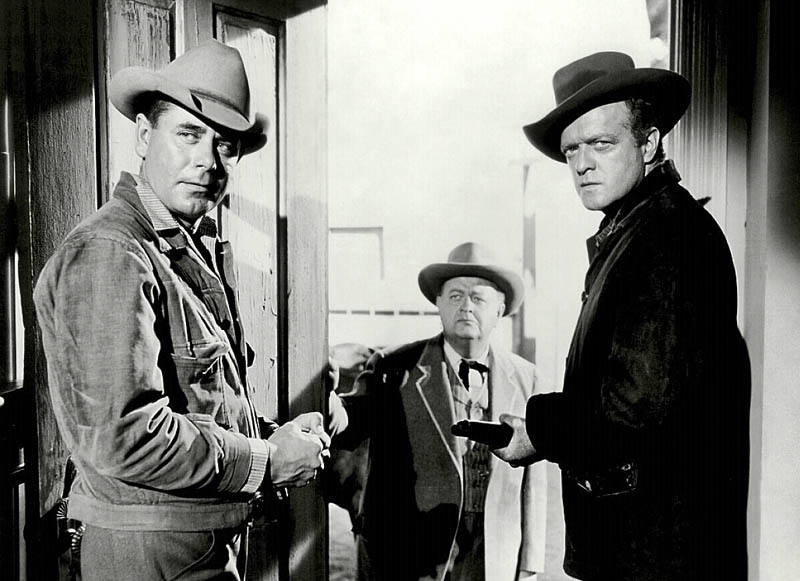
As the train keeps rolling toward the prison at Yuma, Wade explains his sudden compliance to to Dan. Wade tells Dan that he doesn’t like owing anybody favors, and since Dance saved his life back at the hotel, he needed to even the score.
The Hidden Sports Analogy:
Forgetting about the perspective of “good guys” and “bad guys,” 3:10 to Yuma has a striking parallel with the story of former major league baseball pitcher Orlando “El Duque” Hernández. They both involve tales of somebody trying to get a guy to a place some people don’t want them to get to. In the case of Glenn Ford’s “Ben Wade,” they were trying to keep from being taken the territorial prison in Yuma. In the case of “El Duque,” it was all about getting out of the island prison that was Fidel Castro’s Cuba.
In a previous installment in this series, I discussed Fidel Castro’s attempt to come to the United States a a baseball pitcher. Perhaps it was his failure that made him so adamant no other chicos de veraño would get off his island. But Orlando Hernandez had an equal resolve to escape communist Cuba.
That wasn’t always the case. “El Duque” was a hero in Cuban baseball. He pitched for Havana’s Industriales in the Cuban National Series and he was a key component in that squad’s capturing the league’s championship in 1992 and 1996. Hernández also starred for Havana teams Ciudad Habana and Habaneros in the Selective Series. In his ten seasons in the National Series, “El Duque” posted a record of 126–47 with 3.05 Earned Run Average. His winning percentage of .728 as a starting pitcher still stands as the all-time record in the Selective Series.
If that weren’t enough, Hernández was also a fixture on the Cuban national team, where he was instrumental in securing the gold medal for Cuba in baseball at the Barcelona Olympics in 1992. In other words, he was a national hero in a country crazy for baseball.
But everything changed in September of 1995 when “El Duque’s” half-brother Liván Hernández, defected to the United States. In Castro’s Cuba, defection was the unforgivable sin, and it didn’t help matters that Liván became an immediate star in Major League Baseball; his pitching being a key reason the Florida Marlins won the 1997 World Series. Being a lover of baseball, Castro frequented American television to watch the Major Leagues, and seeing one of his stars succeeding in America pissed him off to no end. With no way to effect reprisals against the Hernández who made it to America, the Cuban government took it out on the Hernández they still had.

First, even though he was the best pitcher in the entire country, the Cuban national team left Hernández off the roster for the 1996 Summer Olympics. The fear was since those games were in Atlanta, it would offer to many chances for “El Duque” to join his half-brother in the United States. As a result, just before those games in the summer of 1996, “El Duque” was detained by Cuban state security and interrogated about his relationship with an American sports agent. Three months later, “El Duque” became the “‘Shoeless’ Joe Jackson of Cuban baseball;a man banned from the game he loved for something he didn’t do.
As a result on Christmas Day 1997, “El Duque” and several others boarded a small, leaky boat in the small Cuban port town of Caibarién. Setting out into the strong currents and the shark-infested waters of the Straits of Florida, “El Duque” and his fellow defectors drifted at the mercy of the waves for nearly half a day until they washed up on the beach of an uninhabited island in the Bahamas. Until they were discovered four days later by the U.S. Coast Guard, they lived off what shellfish they could catch and the little water, stale bread, and Spam they had brought with them.
After rescuing them from what was most likely death from starvation and/or dehydration, Coast Guard turned them over to Bahamian authorities in Freeport. As is their usual process, the Bahamian government confined them in a detention center for illegal immigrants pending their eventual return to Cuba. However, Joe Cubas, the American sports agent for which “El Duque” was questioned by Cuban state security, along with representatives of the Cuban-American National Foundation, lobbied the United States government on behalf of Hernández and his fellow refugees. Eventually, U.S. Attorney General Janet Reno offered them a special status known as “humanitarian parole.” This would allow them entry into the United States based on what were judged to be realistic fears of persecution should they be returned to Cuba and their status as exceptionally talented individuals.
However, “El Duque” shocked a lot of people when he declined this offer; little did anybody know he had millions of reasons for doing so. Had “El Duque” accepted Reno’s offer, he would have immediately become a U.S resident. According to the rules of baseball, he would have been subject to baseball’s “regular” draft and thus would have only been able to negotiate a contract with the team that selected his rights.
Instead, Hernández accepted an offer of asylum from the government of Costa Rica. By staying out of the United States, “El Duque” was able to shop his services to any team he wished. As a result, after two months in Costa Rica, Hernández was able to come to the U.S. on a visa arranged by his new employer, the New York Yankees…thanks to a new 4-year, $6.6 million contract.
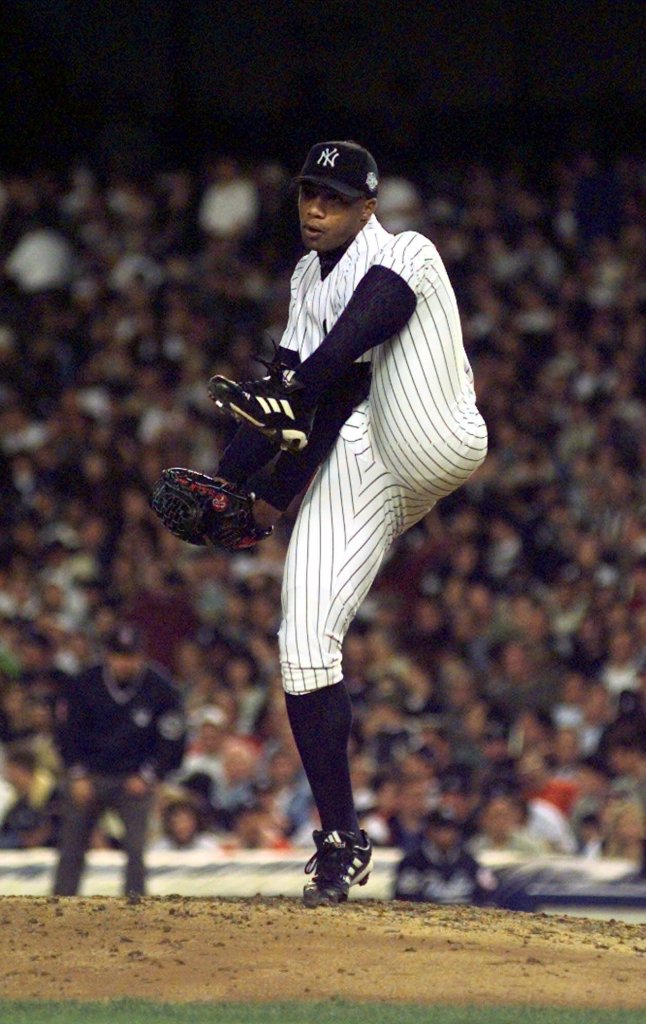
Once in America, “El Duque” resurrected his love of baseball and his status as a baseball hero. New York Yankees fans will never forget the role Hernández, his exaggerated leg kick, and his devastating arsenal of pitches played in the “Pinstripes” taking down three consecutive World Series titles between 1998 and 2000. Fans of the “South Siders” in the “Windy City” will always remember his role in helping the Chicago White Sox end an almost 90-year championship drought.
But out of all that baseball success on both sides of the Straits of Florida, Orlando Hernandez always said one of his favorite things about getting to play baseball in the United States was knowing the Fidel Castro could see him on television and knowing how much he and his half-brother Liván pissed him off…and loving every minute of it.
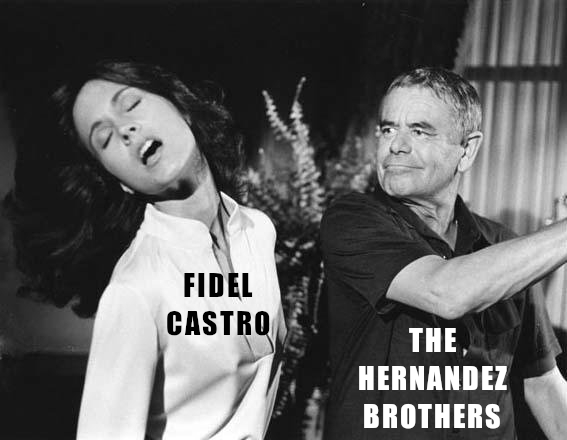
If you think about it, the best way to describe “El Duque’s” life is if Ben Wade broke out of prison, redeemed himself, and still got to keep the money.
The Moral of the Story:
Winning isn’t always about where you end up. Sometimes, what happens along the way matters as well.
BONUS QUESTION:

You might be able to name all the people in this photo with Glenn Ford, but who knows what event brought together this eclectic mix. Don’t ask me because I don’t know!
Check out Dubsism’s Movies and Blog-A-Thons page for a full schedule of projects past, present, and future!












Pingback: the Glenn Ford Blogathon is HERE! – coffee, classics, and craziness
Oh my word, that is SUCH a fascinating analogy!!! I had never heard of the Hernandez brothers, but that is an amazing story (all the more so for being true). I love it! Thanks so much for participating in the blogathon and bringing such a unique, interesting perspective.
LikeLike
Thanks for the kind words and for allowing me to participate!
LikeLiked by 2 people
What a nifty story! And that’s a great comparison between them. Also, now I want to know what that picture at the end is all about. Sigh. Another mystery.
LikeLike
I know, right?! I’m dying to know the “six degrees of separation” between John Wayne and Charles Nelson Reilly!
LikeLike